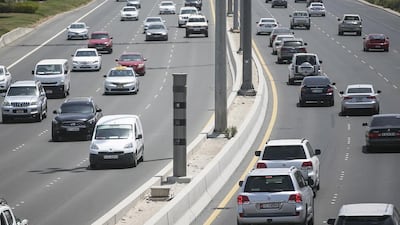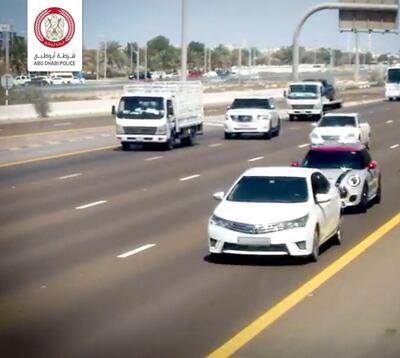Traffic cameras that can detect tailgating will be activated across Abu Dhabi's roads on Wednesday, January 15.
On Monday, police shared a video on Twitter that showed several examples of tailgating on some of the emirate's motorways.
It said drivers who did not leave a safe distance from the vehicle in front of them would be sent a text message warning them that they would be fined the next time they tailgate.
If caught again by the smart system, motorists will be given a Dh400 fine and earn four black points on their licence. It is unclear what distance the cameras will deem to be tailgating but it will likely depend on the speed limit on the road.
Tailgating is one of the five main causes of road deaths across the country, according to police.
“Tailgating can lead to fatal traffic accidents and the smart system, along with the awareness campaigns, will help curb this negative behaviour,” Brig Gen Mohammed Al Humairi, director of the traffic and patrols directorate at Abu Dhabi Police, said on Monday.
A campaign to raise awareness about the new cameras and the dangers of tailgating will be rolled out in five languages.
Last year, a study by UAE University showed tailgating and reckless driving caused half of all traffic accidents between 2012 and 2017.
It also revealed that most of the culprits were drivers aged between 18 and 24.
A quarter of young drivers surveyed by Road Safety UAE last year admitted to tailgating other vehicles.
In the past it has proven difficult to develop technology that can accurately measure the distance between vehicles.
In July 2015, Dubai Police announced they would introduce tailgating cameras to the emirate's roads. But in May the following year, Maj Gen Mohammed Al Zafeen, director of the Federal Traffic Council, said logistical obstacles meant the cameras had yet to be activated.
“It is hard for the motorist to estimate the exact distance of 10 to 20 metres, depending on what the radar is set on,” he said at the time.
Brig Jamal Al Ameri, executive director of Saeed Society to Reduce Traffic Accidents, said the new cameras will likely improve road safety.
“It will force motorists to follow traffic rules and control the negative behaviour of drivers, no matter how old they are, as they will try to avoid paying the fines."
He said smart radars, including the Vitronic radar seen across the country, can detect many traffic offences but motorists need to be made aware how much space they should be leaving between vehicles.
“On a highway, drivers should leave the space of two lampposts between vehicles in order to consider it as a safe distance,” he said.
On Monday, commuters welcomed the move saying it would protect them from reckless drivers.
“I can't wait for next week to see how drivers will behave after activating this smart system,” said Jamila Al Halabi, an event organiser who lives in Abu Dhabi but drives to Dubai daily for work.
“I drive according to the speed limits and I don’t understand how and why tailgaters try to pass me,” the Canadian, 37, said.
“They drive so close to my car and start swaying left and right and use their headlights as if they have an emergency or something which scares me every time."
Another motorist said penalising tailgating was a good start but heftier fines are needed to stop the practice entirely.
“Some motorists not only flash at you and drive too close to force you to move away, but they also pass you from the left lane and drive directly in front of your vehicle then deliberately step on the breaks as if they are punishing you for not moving out of their way,” said Zaid Abdulqadir, 41.
The Jordanian father-of-two, who lives in Abu Dhabi, said the fine should be more than Dh400 because a bad accident caused by tailgating could lead to road deaths.
Residents also shared their thoughts on social media with some saying that people driving much slower than the advertised speed limit in the first or second lane should also be penalised.
“Can you also monitor those doing 40kph under the speed limit in the second lane so that you can actually get out of the way of all those drivers that try to run you off the road?” asked Canna Gray, who posted on Abu Dhabi Police's Facebook page.
Ahmed Saad argued that motorists driving slowly in the 'fast lane' — the overtaking lane on the far left — posed an equal danger to drivers on the road, particularly if they did not give way to faster moving vehicles.
"The fine should be the other way around. Fine the slow cars on the fast lane as these cars create traffic on the road and ... sometimes, by not moving out of the way, the following car tends to overtake from the right to pass the slow car.
"This provokes accidents because the slow cars don't follow the speed limit and do not give way."
Sinilal KS said innocent bystanders often got caught in the wake of tailgaters.
“Some careless drivers are always on the road to threaten others by flashing the head light and tailgating," he said.
“But good drivers also get trapped in this radar because of this reckless drivers.”


